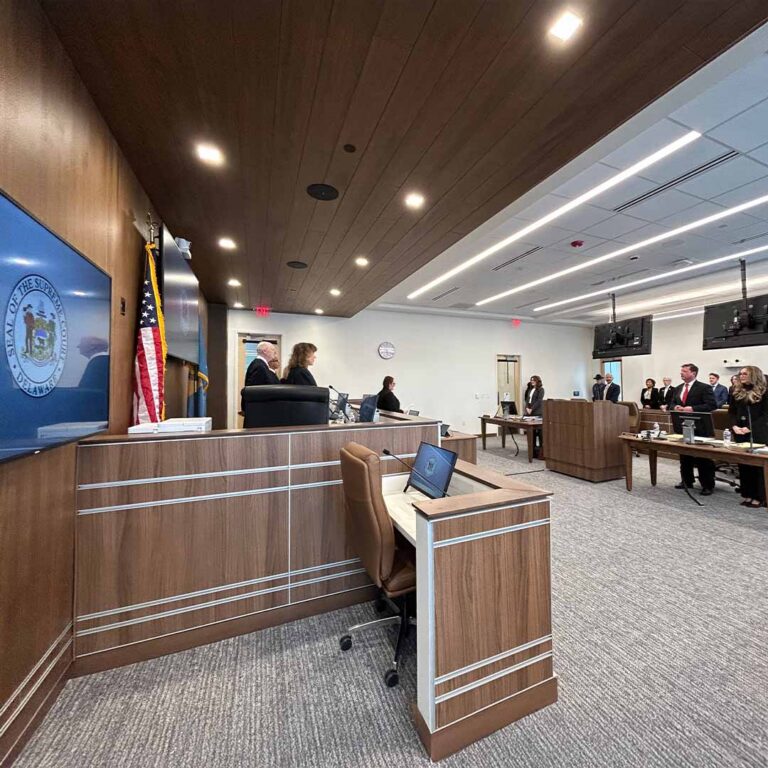Long Live the Modern Library

In January, I began working at Wilmington University School of Law as the associate dean of Library and Information Resources. I arrived here through a winding path from law.
After graduating from Georgia State University College of Law and passing the Georgia bar exam, I practiced law for a few years, not quite finding my fit. So, I attended the University of Washington (Seattle) iSchool law librarianship program, designed to train lawyers as law librarians. Since my graduation a year later, I have worked as an academic lawyer-librarian.
When I tell people I am a librarian, I typically get one response: “Isn’t everything online?” As a former foreign and international law research librarian who has had to track down materials that are neither in English nor online, I could spend quite a bit of time explaining how the demise of the print library is overstated. Instead, I would like to focus on the implied inquiry I always hear: What do I actually do? This question seems particularly relevant to my charge of building and maintaining the law library’s collection in electronic format.
What is a Library?
The traditional vision of the library is a museum for dusty tomes on shelves that hardly anyone reads. Those shelves surround tables where patrons might sit if they go to the library. They are controlled by old lady librarians in squeaky orthopedic shoes who tell people to be quiet. This image is a backdrop great for studying in silence, graduation pictures, and faculty portraits, but it is a relic all the same.
Many law libraries are indeed blessed with the architectural interest that many think of in their mind’s eye: stained glass and vaulted ceilings with Renaissance paintings; fat babies with wings; biblical renderings; clouds framing the room; and light spilling from above to illuminate truths found on the open page. But libraries today have complemented their visual appeal with utilitarianism. Libraries have adapted to modern research methods and evolved into ubiquitous centers where students do their work.
A Study Center
Students use the library as an extension of the classroom. Many study in the library between and after classes rather than take their work home. Others gather in groups to work on individual or group projects. They use the law library as a central meeting place to outline and study for exams. In a sense, the law library functions as a study hall for the law school with a facility to socialize. Some libraries even provide games and puzzles for students to take a break from their work.
Law librarians work at the center of this study space, ensuring students can find reserve materials and casebook supplements to support their study. Librarians provide access to print and electronic resources available on and off campus. Librarians facilitate access to materials from other libraries through interlibrary loans. Librarians also direct students where to find answers to their reference questions; the research is the student’s work.
A Technology Center
Students use the library as a technology center. They use the multi-function printer to duplicate resumes and print cover letters. They come to the library to use desktop computers when their laptops don’t work or to borrow computers when their connected IT departments provide those resources.
In the library as a technology center, law librarians supply and arrange repair services for printers, copiers, and computers for students to use. They provide the necessary extras: keyboards, mice, toner, paper, staples, and paper clips. They also supply power cords to check out should students forget theirs at home.
Law librarians facilitate access to electronic databases. We reach out to, establish, and maintain relationships with vendor representatives. When we select a new database, we ensure those vendors are contracted and paid. We then provide access to legal databases through password management, troubleshooting access, and login problems. We organize training on new legal databases with a vendor representative or librarian. Librarians also keep abreast of changes in legal technology and databases when considering what to purchase for law school.
A Teaching and Research Center
Law librarians of all genders perform many duties outside of shushing patrons — which doesn’t really happen anymore. We work with faculty, staff, and students to support research and scholarship efforts. We train our faculty’s research assistants in good research techniques and inform them about resources that might help with their research.
Law librarians teach law students, faculty, and staff the efficient use of legal research databases. Most people already know how to perform a Google search. Law librarians augment those basic research skills by teaching users the quirks of navigating different legal databases to find the needed materials.
In addition, law librarians teach information literacy. There are, at minimum, 1.2 million terabytes of information on the internet (1 terabyte=1000 gigabytes), which increases daily. However, not everything online is easily accessible, factual, or relevant to a research query. Librarians train researchers to determine whether a website is trustworthy and has up-to-date information.
A Changing Entity
Unlike public libraries, law school libraries have been slower in adopting new online technology, partly because the American Bar Association (ABA), the U.S. law school accreditation organization, has required that libraries maintain a physical collection, i.e., books on shelves. Law school libraries have pushed the envelope on this requirement for decades as the commonly used legal publishers began providing online access to their information as technology advanced. COVID-19 left almost all law libraries brainstorming how to make their resources available to all their users while publishers began adapting to meet those needs.
In February 2024, the ABA stopped requiring that law school libraries maintain a physical collection to receive and maintain accreditation. Instead, “the choice of format, ownership, and means of reliable access for any part of the law library’s collection shall be sufficient for the law school to operate in compliance with the [accreditation] Standards and to carry out its program of legal education” (ABA Accreditation Standard 604 (b) (2024)). This change in accreditation standards allows me to create a purely digital library collection based on the needs of Wilmington University School of Law, a decision that I will make on a case-by-case basis.
Many believe that the library is dead because of the internet. If the library is considered dead, it is merely an image of a beautiful mausoleum. However, modern law libraries are very much alive and thriving. They serve as essential centers for study, technology, research, and teaching within law schools. They provide a convenient study space for law students when not in class, provide the resources and services that students, faculty, and staff need to thrive in the law community, and provide access to law librarians who can direct students and faculty in their research.
Only the mythical relic of the law library is dead. So, long live the modern library!
—Trezlen Drake, J.D., MLIS, MFA
Associate Dean of Library and Information Resources and Attorney Trezlen Drake has spent over 10 years as an academic law librarian, with experience in research, collection development, and electronic resources at top-ranked law schools and a strong record of service in the profession. Learn more about her at law.wilmu.edu.



